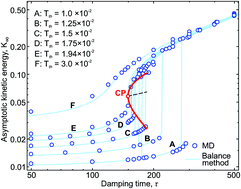Dissipative phase transitions in systems with nonreciprocal effective interactions
Abstract
The reciprocity of effective interparticle forces can be violated in various open and nonequilibrium systems, in particular, in colloidal suspensions and complex (dusty) plasmas. Here, we obtain a criterion under which a nonreciprocal system can be strictly reduced to a pseudo-Hamiltonian system with a detailed dynamic equilibrium. In particular, the criterion is satisfied for catalytically active colloids interacting via nonreciprocal diffusiophoretic forces. However, in the general case, when this criterion is not satisfied, the steady state is determined by the interplay between dissipation and the energy source due to the nonreciprocity of interactions. The results indicate the realization of bistability and dissipative spinodal decomposition in a broad class of systems with nonreciprocal effective interactions.



 Please wait while we load your content...
Please wait while we load your content...